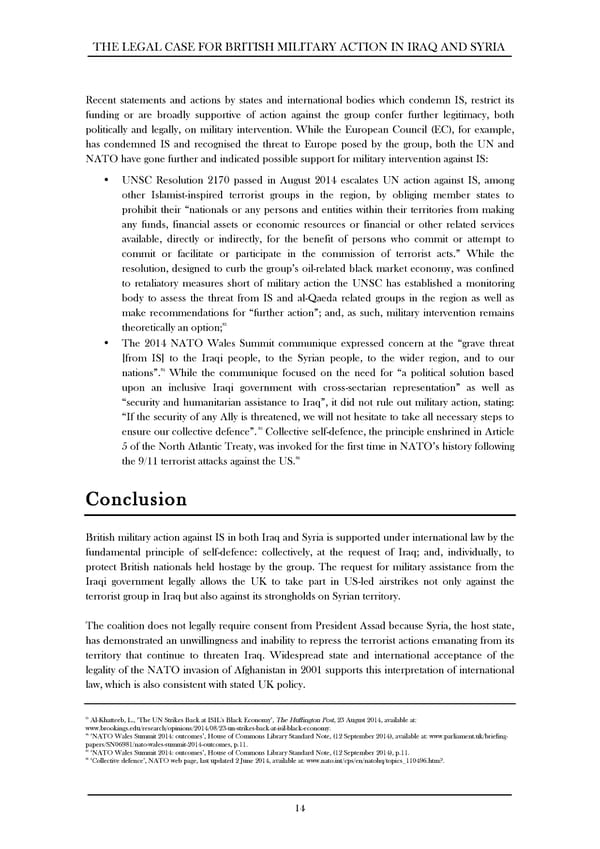THE LEGAL CASE FOR BRITISH MILITARY ACTION IN IRAQ AND SYRIA Recent statements and actions by states and international bodies which condemn IS, restrict its funding or are broadly supportive of action against the group confer further legitimacy, both politically and legally, on military intervention. While the European Council (EC), for example, has condemned IS and recognised the threat to Europe posed by the group, both the UN and NATO have gone further and indicated possible support for military intervention against IS: • UNSC Resolution 2170 passed in August 2014 escalates UN action against IS, among other Islamist-inspired terrorist groups in the region, by obliging member states to prohibit their “nationals or any persons and entities within their territories from making any funds, financial assets or economic resources or financial or other related services available, directly or indirectly, for the benefit of persons who commit or attempt to commit or facilitate or participate in the commission of terrorist acts.” While the resolution, designed to curb the group’s oil-related black market economy, was confined to retaliatory measures short of military action the UNSC has established a monitoring body to assess the threat from IS and al-Qaeda related groups in the region as well as make recommendations for “further action”; and, as such, military intervention remains 83 theoretically an option; • The 2014 NATO Wales Summit communique expressed concern at the “grave threat [from IS] to the Iraqi people, to the Syrian people, to the wider region, and to our 84 nations”. While the communique focused on the need for “a political solution based upon an inclusive Iraqi government with cross-sectarian representation” as well as “security and humanitarian assistance to Iraq”, it did not rule out military action, stating: “If the security of any Ally is threatened, we will not hesitate to take all necessary steps to 85 ensure our collective defence”. Collective self-defence, the principle enshrined in Article 5 of the North Atlantic Treaty, was invoked for the first time in NATO’s history following the 9/11 terrorist attacks against the US.86 Conclusion British military action against IS in both Iraq and Syria is supported under international law by the fundamental principle of self-defence: collectively, at the request of Iraq; and, individually, to protect British nationals held hostage by the group. The request for military assistance from the Iraqi government legally allows the UK to take part in US-led airstrikes not only against the terrorist group in Iraq but also against its strongholds on Syrian territory. The coalition does not legally require consent from President Assad because Syria, the host state, has demonstrated an unwillingness and inability to repress the terrorist actions emanating from its territory that continue to threaten Iraq. Widespread state and international acceptance of the legality of the NATO invasion of Afghanistan in 2001 supports this interpretation of international law, which is also consistent with stated UK policy. 83 Al-Khatteeb, L., ‘The UN Strikes Back at ISIL's Black Economy’, The Huffington Post, 23 August 2014, available at: www.brookings.edu/research/opinions/2014/08/23-un-strikes-back-at-isil-black-economy. 84 ‘NATO Wales Summit 2014: outcomes’, House of Commons Library Standard Note, (12 September 2014), available at: www.parliament.uk/briefing- papers/SN06981/nato-wales-summit-2014-outcomes, p.11. 85 ‘NATO Wales Summit 2014: outcomes’, House of Commons Library Standard Note, (12 September 2014), p.11. 86 ‘Collective defence’, NATO web page, last updated 2 June 2014, available at: www.nato.int/cps/en/natohq/topics_110496.htm?. 14
 The legal case for action Page 13 Page 15
The legal case for action Page 13 Page 15